Front Cover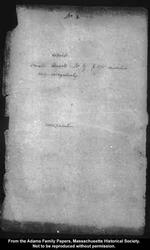
No. 2 copied.
[The preceding text was added in the handwriting of Charles Francis Adams][No transcription available -- see page image]
Inside Front Cover
Page 1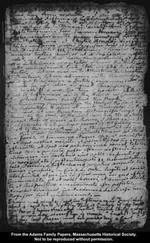
BRAINTREE OCTR. 5TH. 1758.
Yesterday arrived here from Worcester. I am this Day about beginning Justinians Institutions with Arnold Vinnius's Notes. I took it out of the Library at Colledge. It is intituled, D. Justiniani Sacratissimi Principis Institutionum sive Elementorum Libri quatuor, Notis perpetuis multo, quam hucusque, dilligentius illustrati, Cura & Studio, Arnoldi Vinnii J.C. Editio novissima priori Progressu Juris civilis Romani, Fragmentis XII. Tabularum & Rerum Nominumque Indice Auctior, ut ex Praefatione nostra patet. -- Now I shall have an opportunity of judging of a dutch Commentator whom the Dedication calls celeberrimus sua Etate in hac Academia Doctor. -- Let me read with Attention, Deliberation, Distinction. Let me admire with Knowledge. It is low to admire a Dutch Commentator merely because he uses latin, and greek Phraseology. Let me be able to draw the True Character both of the Text of Justinian, and of the Notes of his Commentator, when I have finished the Book. Few of my Contemporary Beginners, in the Study of the Law, have the Resolution, to aim at much Knowledge in the Civil Law. Let me therefore distinguish myself from them, by the Study of the Civil Law, in its native languages, those of Greece and Rome. I shall gain the Consideration and perhaps favour of Mr. Gridley and Mr. Pratt by this means. -- As a stimulus let me insert in this Place justinians Adhortationem ad Studium Juris. "Summa itaque ope et alacri Studio has Leges nostras accipite: et vosmet ipsos sic eruditos ostendite, ut Spes vos pulcherrima foveat, toto legitimo Opere perfecto, posse etiam nostram Rem publicam in Partibus ejus vobis credendis gubernari." Data Constantinopoli XI. Kalendas Decembris, Domino Justiniano, perpetuo Augusto tertium Consule.Cic. i . de Orat. -- Pergite, ut facitis, Adolescentes, atque in id Studium in quo estis incumbite ut et vobis honori, et Amicis Utilitati, et Reipublicae emolumento esse possitis. -- Arnoldus Vinnius in Academia Leidensi Juris Professor fuit celeberrimus.
I have read about 10 Pages in Justinian and Translated about 4 Pages into English. This is the whole of my Days Work. I have
smoaked, chatted, trifled, loitered away this whole day almost. By much the greatest Part of this day has been spent, in unloading a Cart, in cutting oven Wood, in making and recruiting my own fire, in eating nuts and apples, in drinking
Page 2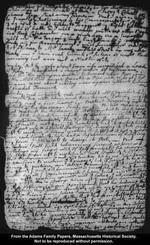
Tea, cutting and
smoaking Tobacco and in chatting with the Doctor's Wife, at their House and at this., Chores, Chatt, Tobacco, Tea, Steal away Time. But I am resolved to translate Justinian and his Commentators Notes by day light and read Gilberts Tenures by Night till I am master of both, and I will meddle with no other Book in this Chamber on a Week day. On a Sunday I will read the Inquiry into the Nature of the human Soul, and for Amusement I will sometimes read Ovids Art of Love to
Mrs. Savel. -- This shall be my Method. -- I have read Gilberts 1st Section, of feuds, this evening but am not a Master of it.
FRYDAY. OCT. 6.
Rose about sun rise. Unpitched a Load of Hay. Translated a Leaves more of Justinian, and in the afternoon walked to Deacon Webbs, then round by the Mill Pond home. Smoaked a Pipe with Webb at the Drs. and am now about reading over again Gilberts section of feudal Tenures.
SATURDAY [7 OCTOBER].
Read in Gilbert. Rode with Webb to Mr. Cranche's. Dined and drank Tea with him, and then home. Saturday night.
SUNDAY [8 OCTOBER].
Read a few Leaves in Baxters Enquiry into the Nature of the human Soul. He has explaind with great Exactness, the Resistance, which Matter makes to any Change of its State or Condition, whether of motion or of Rest. by positive inactivity The Vis Inertix, the positive Inactivity of matter not barely its Inactivity, but its AntiActivity. For it not only is destitute of a Power of changing its state from Rest to motion or from motion to Rest, but it has the possitive Power, each single Particle has a Possitive Power of Resisting any force that attempts to change its state. But a [illegible] leaden Ball, held between my fingers, as soon as I withdraw my fingers, will of itself for ought I see change its State from rest to motion and fall suddenly to the floor. This Phenomenon is not Vis Inertiae, 'tis by no Reluctance or Aversion to motion that it moves, but it seems to be a Tendency to motion, an Active Principle. If it is passive the Agent that presses it downwards is invisible. But because matter in all the Experiments I have tried, resists a Change from rest to motion upwards, will it follow, that all matter essentially resists a Change from rest to motion, downwards. Is it a Posteriori from Experiments, that he deduces this Proposition, that all matter essentially resists any Change of State, or is it a Priori from some Property that is essentially included in our Idea of Matter that he demonstratively [argues?] this Vis Inertiae. [illegible] Is Inactivity, and AntiActivity, included in our Idea of Matter? Are Activity, Perceptivity &c. Properties that we by only comparing Ideas can see to be incompatible to any Properties of matter.
If nothing is Matter which has not this antiactive Principle, then human Minds are not matter for they have no such Principle. We are conscious, that we can begin and end motion of ourselves.
Page 3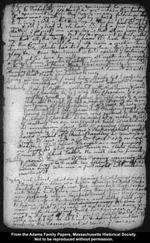
If he argues a Posteriori from Experiments, he can pretend only to Probability. For Unless he was certain that he had made the Experiment and found the Property in every Particle of Matter that ever was created, he could not be certain, that there was no Particle in the World, without this Property,
tho he had tried all but one and found that they had it. We have tried but a few Parcells of Matter. The Utmost we can say is, that all we have tried are inactive.
[illegible] But for Argument sake I will deny, that all the Parcels that we have tried, have this Property. On the Contrary I will say that all have a motive Power downwards. Powder has an Active Power springing every Way &c. Thus Experiment is turned against the Doctrine. I cant yet see how he will prove all matter Anti inactive a Priori from Properties of matter before known essential, with which he must
shew this to be necessarily connected.
MONDAY OCTR. 9.
Read in Gilberts Tenures. I must and will make that Book familiar to me.
TUESDAY [10 OCTOBER].
Read in Gilbert. I read him slowly, but I gain Ideas and Knowledge as I go along, which I dont always, when I read.
WEDNESDAY [11 OCTOBER].
Rode to Boston. Conversed with Ned Quincy and Saml., Peter Chardon &c. By the Way Peter Chardon is a promising Youth. He aspires, and will reach to a considerable Height. He has a sense of the Dignity and Importance of his Profession, that of the Law. He has a just Contempt of the idle, incurious, Pleasure hunting young fellows of the Town, who pretend to study Law. He scorns the Character, and he aims at a nobler. He talks of exulting in an unlimited field of natural, civil and common Law, talks of nerving, sharpening the mind by the Study of Law and Mathematicks, quotes Locks Conduct of the Understanding and transcribes Points of Law into a Common-Place Book on Locks Modell. This fellows Thoughts are not employed on Songs and Girls, nor his Time, on flutes, fiddles, Concerts and Card Tables. He will make something.
THURDSDAY [12 OCTOBER].
Examined the Laws of this Province concerning Pads, Cattle, fences &c. and read in Gilbert. This small volume will take me a fortnight, but I will be master of it.
FRYDAY [13 OCTOBER].
Read Gilbert. Went in the Evening to
Coll. Quincys. Heard a
Tryal before him, as a justice between Jos. Field and Luke Lambert. The Case was this. Lamberts Horse broke into Fields Inclosure, and lay there some time, damage feasant. When Lambert found that his Horse was there he enters the Inclosure and
altho Feild called to him and forbid
[illegible] it, waved his Hat, and Screamed at the Horse, and drove him away, with
[out] tendering Feild his Damages. This was a Rescous of the Horse, out of Feilds Hands, for
altho Lambert had a Right to enter and take out his
[Horse] tendering the Damages, yet, as
[the] Words
[of] the Law are
Page 4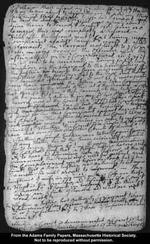
"that whoever shall rescous any Creature out of the Hands of any Person about to drive them to pound, whereby the Party injured shall be liable to lose his Damages, and the Law be eluded, shall forfeit &c.," and as Feild was actually about to drive them to Pound, and Lambert offered him no Damages, this was
compleatly a Rescous. Feild, after the Rescous, went to
Coll. Quincy, made Complaint against Lambert and requested and obtained a Warrant. The Warrant was directed to the Constable, who brought the Offender before the justice, attended with the Complainant, and the Witnesses ordered to be summoned. Quincy, for Defendant, took Exception on the Warrant, to the Jurisdiction of the justice, because the sum originally sued for, consisting of the forfeiture of 40s. to the Poor, and the Parties Damages estimated at 9d. which was 40s -- 9d., was a greater sum than
[illegible] the justice can take Cognisance of, and because the Words of this Act of the Province are, that this 40s -- to the Poor, and these Damages to the Party injured shall be recovered, by Action &c., in any of his Majesties Courts of Record. Now as the Court of a single justice is not
[illegible] one of his Majesties Courts of record
[illegible] the forfeiture and Damages prayed for in this Complaint, cannot be recovered in this Court. The justice adjourned his Court till 8 o'clock
in this monday morning, in order to inform himself, 1st. Whether the Court of a single justice of the Peace was one of his Majesties Courts of Record? 2. Whether a single justice can take Cognisance of any Matter, in which the sum originally prosecuted for is more than 40s.? If upon Examination the
Coll. shall find, that, a single justice has no Authority to hear and determine such a Rescous, at the Adjournment the Proceedings will be quashed, and the Complainant must begin de Novo, but if he finds, that a single justice has Authority, to determine the matter, he will proceed to judgment. -- The Questions that arise, in my mind, on this Case are these.
1. What is the true Idea, and Definition of a Court of Record? What Courts in England and what in this Province are Courts of Record and what are not? Wood, Jacobs, &c.
2. Whether a justice has Authority, by Warrant, to hear and determine of any offence the Penalty of which, or the forfeiture to the [King], the Poor, the Informer &c. is more than 40s.?
[3.] Whether a Court is denominated a Court of Record from its keeping Records of its Proceedings?
Page 5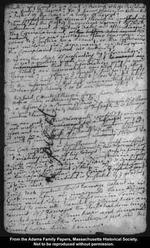
Whether every Court is a Court of Record, whose President is a judge of Record? For it seems plain in Dalton that a justice of the Peace is a judge of Record?
4. On supposition the Warrant should be quashed, who should pay the Cost of the original Warrant, of the Defendants attendance, and of Witnesses' Oaths and attendance? The Complainant, [illegible] who was mistaken thro Ignorance in going to the justice for a Remedy, or the Justice who was mistaken, in the same manner, in Acting upon the Complaint beyond his Authority?
5. What are the Steps of prosecuting by Information? Is not a motion made in Court, [illegible] that the Information may be amended or filed? Are Informations ever filed, but by Attorney General? When the Penalty sued for by the Information is half to the King or half to the Poor and the other half to the Informer, is the Defendant committed till he discharges the Penalty? Or is an Execution ever issued?
[6.] Tis said Courts of Record alone have Power to impose a fine, or Imprison. [Query] which?
7. A Rescous is a Breach of Law and a Breach of the Peace, and Remedy for it may be by Action of Trespass, which is always contra Pacem.
8. Are not justices Warrants confined to criminal matters? [illegible] May a Warrant be issued for a Trespass Quare Clausum fregit? It may for a Trespass of assault and Battery. Justices may punish by fine, Imprisonment, Whipping Stripes &c.
The Coll. inquired, what Punishment he could inflict on a Constable for Disobedience to his Warrant, for not making Return of his Doings? And he found a Case ruled in [King's] Bench that a Constable is a subordinate officer to a justice of the Peace and is indictable at common Law for neglect of Duty. The Malefeasance or Nonfeasance of officers are Crimes and offences that may be inquired of, indicted or presented by the grand jury at Common Law.
Copied.
[The preceding text was added in the handwriting of Charles Francis Adams] [This notation was added to the original manuscript diary by Charles Francis Adams who copied many of John Adams's diary entries into other manuscript volumes. ]
Feild took Lamberts Horses Damage feasant in his Close once before and impounded them, and gave him verbal Notice, that his Horses were in Pound, but neglected to give either Lambert or the Pound keeper an account of the Damages the Horses had done him. Lambert went to the Pound keeper and demanded his Horses, tendering the Poundkeepers fees, and the Pound keeper delivered them up.
Page 6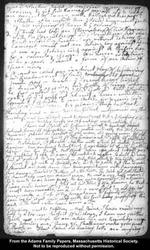
Now Q. Whether Feild is injoined by any Law of the Province, to get his Damages appraised and to lodge an account of them with the Pound keeper?
2. Whether as he neglected this, the Pound keeper cant justify his resigning of them to the owner?
3. If Feild had lodged an Estimation of his Damages with the Pound keeper, and the Pound keeper had nevertheless resigned the Creatures up, without taking the Damages, would not an Action lay against him as an Action lies against a Prison keeper for a voluntary Escape? And Quere what Action would be proper. I want a form of an Action of Escape, now.
4. It cant be called an indirect Way of delivering his Creatures out of Pound, [illegible] to [illegible] pay or tender the Poundkeeper his fees and demand and receive his Cattle of him, when he has unlocked and opened the Pound Gate and turned the Creatures out? So that it will not admit a Quere whether Lambert is liable to an Action for receiving his Horses of the Pound keeper. Tis plain I think he is not.
MONDAY [16 OCTOBER].
Read a few Pages in Gilbert. I proceed very slowly.
TUESDAY [17 OCTOBER].
Read in Gilbert. Went to Monatiquot to see the Raising of the new Meeting House. No Observations worth noting.
I have not Spirits, and Presence of mind, to hunt up objects seek out scenes of Observation, and to watch critically the Air, Countenances, Actions and Speeches of old men, and young men, of old Women and young Girls, of Physicians and Priests, of old Maids and Batchelors. I should chatter with a Girl, and watch her Behaviour, her answers to Questions, the workings of Vanity and other Passions in her Breast. But objects before me dont suggest proper Questions to ask, and proper Observations to make, so dull and confused at present is my mind. -- Betsy Niles affects to trip lightly across the floor, to act with a Sprightly Air, and to be polite. But she is under Restraint, and awe, from her Unacquaintance with Company. Saw Lawyer Thachers Father, at Mr. Niles's. He said old Coll. Thatcher of Barnstable was an excellent man. "He was a very holy man. I used to love to hear him pray. He was a Counsellor, and a Deacon. I have heard him say, that of all his Titles, that of a Deacon, he tho't the most honourable." - [Query] is he a new Light? Old Age has commonly a sense of the Importance and Dignity of Religion. I dare say, he is not well pleased with his son's professing the Law. He had rather have him a Deacon.
WEDNESDAY [18 OCTOBER].
Went to Boston.
Bob Paine. I have ruined myself, by a too eager Pursuit of Wisdom. I have now neither Health [illegible] enough for an active Life, nor Knowledge enough for a sedentary one. Quincy. We shall never make your great fellows.
Thus Paine and Quincy both are verging to Despair.
Page 7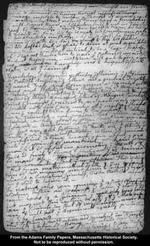
Paine. If I attempt a Composition, my Thoughts are slow and dull.
Paine is discouraged, and Quincy has not [illegible] Courage enough to harbour a Thought of acquiring a great Character. In short, none of them have a foundation that will support them. P. Chardon seemed to me in the directest Road to Superiority. Pains Face has lost its Bloom, and his Eye its Vivacity and fire. His Eye is weak, his Countenance pale and his Attention unsteady. And what is worse, he suffers this decline of Health to retard, almost to Stop his studies. And Q's dastard soul is afraid to aim at great Acquisition.
Paine (to me). You dont intend to be a Sage, I suppose.
Oh! P. has not Penetration to reach the Bottom of my mind. He dont know me. Next time I will answer him, A Sage, no. [illegible] Knowledge eno' to keep out of fire and Water, is all that I aim at.
I borrowed yesterday of Quincy, the 1 st Volume of Batista Angeloni's Letters, and a general Treatise of naval Trade and Commerce as founded on the Laws and Statutes of this Realm in which those (Laws and Statutes I suppose) relating to his Majesties Customs, Merchants, Masters of Ships, Mariners, Letters of Marque, Privateers, Prizes, Convoys, Cruizers &c. are particularly considered and treated with due Care under all the necessary Heads from the earliest time down to the present, 2nd Edition in 2. Volumes. Read Angeloni thro I believe, and studied, carefully, about a dozen Pages in mercantile Law. Angelonis Letters are all of a Piece. He has an odd System of Faith, viz. that Utility is Truth and therefore that Transubstantiation is true, and Auricular Confession is true because they are useful, they promote the Happiness of mankind. Therefore Rain is true because it is useful in promoting the Growth of Herbs, and fruits and flowers, and consequently of Animals for mans Use. [illegible] This is very different from Mathematical Truth, and this Explanation of his meaning gives Room to suspect that he disbelieves a Revelation, himself, tho he thinks it useful for the World to believe it.
He reasons, who can conceive that a Being of infinite Wisdom, Justice and Goodness, would suffer the World to be governed 2000 [years] by a Religion that was false. But may not this Question be asked of the Mahometan, the Chinese, in short of every Religion under the sun, and will not the Argument equally prove them all to be true?
What Passion is most active and prevalent in
Dr. Savel's mind? The Desire of Money. He retails Sugar by the Pound,
[illegible] by the bunch, Pins, Pen knifes, to save these Articles in his family, and
Page 8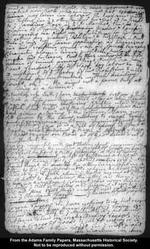
neat a few Shillings Profit. He
[illegible] makes poor People who are in his Debt
[illegible] pay him in
Labour. He bargains with his Debtors in the 2 other Parishes for Wood, which he sends to the Landing Place, and to Dr. Marshes. Thus by practice of
Physick, by
trading in trading and bargaining and scheming he picks up a Subsistance for his family and gathers very gradually, Additions to his Stock. But this is low. The same Application, and scheming in his Profession, would raise and spread him a Character, procure him profitable Business and make his fortune. But by this contemptible Dissipation of mind, among Pins, Needles, Tea, Snuff Boxes, Vendues, Loads of Wood, day
labour &c. he is negligent of the Theory of his Profession, and will live and die unknown. -- These driveling souls, oh! He aims not at fame, only at a Living and a fortune!
SATURDAY [21 OCTOBER].
Rose with the sun. took the horse Brot up the Horse and took a Ride over Penns Hill, as far as John Haywards in a cold, keen, blustering N. Wester. Returned and breakfasted. I feel brac'd, as if the cold [illegible] clear Air had given a Spring to the System. -- I am now sett down to the Laws relating to naval Trade and Commerce. Let me inquire of the next Master of a Ship that I see, what is a Bill of Lading, what the Pursers Book. What Invoices they keep. What Account they keep of Goods received on Board, and of Goods delivered out, at another Port, &c.
SUNDAY [22 OCTOBER].
Conversed with Capt. Thatcher about commercial affairs. -- When he receives a freight of Goods on board his Vessell, he signs 3 Bills of Lading (a Bill of Lading, by the Way, is [illegible] a List of the several Articles, and the Receipt of them signed by the Master) one two of which the Merchant keeps, and [illegible] the other he incloses in a Letter to his Correspondent to whom he sends the Goods and sends it by the Vessell. When the Master arrives at the Port he is destined to, he delivers the Letter, and then the Goods to his Employers Correspondent, who upon Receipt indorses the Bill of Lading, and delivers it up to the Master, and this Bill thus endorsed, will [illegible] the other two in the Merchants Hands. The Receiver of Goods pays the some Masters freight.
Some Voyages, We have nothing to do, but receive Goods on board, keep them safely on the Voyage and deliver them safely to the Merchant to whom they are directed. But sometimes we make Trading Voyages. We carry a Cargo of Goods, to sell for money or exchange for other Goods, in the most profitable manner we can.
Page 9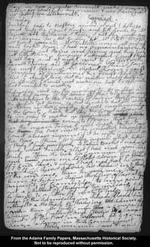
Here we keep a regular Account, make the owners Debtors for Goods that we buy or receive, and give them Credit for Goods that we deliver out.
Copied. ["Copied. " added by Charles Francis Adams] [This notation was added to the original manuscript diary by Charles Francis Adams who copied many of John Adams's diary entries into other manuscript volumes. ]
MONDAY [23 OCTOBER].
Rode to Boston. Arrived about 1/2 after 10. Went into the Court House, and sett down by Mr. Paine att the Lawyers Table. I felt Shy, under Awe and concern, for Mr. Gridley, Mr. Prat, Mr. Otis, Mr. Kent, and Mr. Thatcher were all present and looked sour. I had no Acquaintance with any Body but Paine and Quincy and they took but little Notice. However I attended Court Steadily all Day, and at night, went to Consort with Samll. Quincy and Dr. Gardiner. There I saw the most Spacious and elegant Room, the gayest Company of Gentlemen and the finest Row of Ladies, that ever I saw. But the weather was so dull and I so disordered that I could not make one half the observations that I wanted to make.
WEDNESDAY [25 OCTOBER].
Went in the morning to Mr. Gridleys, and asked the favour of his Advice what Steps to take for an Introduction to the Practice of Law in this County. He answered "get sworn."
Ego. But in order to that, sir, as I have no Patron, in this County.
G. I will recommend you to the Court. Mark the Day the Court adjourns to in order to make up judgments. [illegible] Come to Town that Day, and in the mean Time I will speak to the Bar for [illegible] the Bar must be consulted, because the Court always inquires, if it be with Consent of the Bar.
Then Mr. Gridley inquired what Method of Study I had pursued, what Latin Books I read, what Greek, what French. What I had read upon Rhetorick. Then he took his Common Place Book and
[illegible] gave me Ld. Hales Advice to a Student of the Common Law, and when I had read that, he gave me Ld.
[Chief ] [Justice] Reeves Advice
[to] his Nephew, in the Study of the common Law. Then He gave me a Letter from Dr. Dickins, Regius Professor of Law at the University of Cambridge, to him, pointing out a Method of Studying the civil Law. Then he turned to a Letter He wrote himself to judge Lightfoot, Judge of the Admiralty in Rhode Island, directing to a Method of Studying the Admiralty Law. Then Mr. Gridley run
[illegible] a Comparison between the Business and studies of a Lawyer or Gentleman of the Bar, in England, and that of one here. A Lawyer in this Country must study common Law and civil
Page 10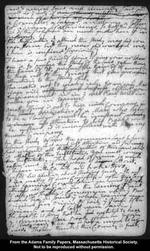
Law, and natural Law, and Admiralty Law, and must do the duty of
[illegible] a Counsellor, a Lawyer, an Attorney, a sollicitor, and even of a scrivener, so that the Difficulties of the Profession are much greater here than in England.
The Difficulties that attend the study may discourage some, but they never discouraged me. [Here is conscious superiority.]
I have a few Pieces of Advice to give you Mr. Adams. One is to pursue the Study of the Law rather than the Gain of it. Pursue the Gain of it enough to keep out of the Briars, but give your main Attention to the study of it.
The next is, not to marry early. For an early Marriage will [illegible] obstruct your Improvement, and in the next Place, twill involve you in Expence.
Another Thing is not to keep much Company. For the [illegible] application of a Man who aims to be a lawyer must be incessant. [illegible] His Attention to his Books must be constant, which is inconsistent with keeping much Company.
In the study of Law the common Law be sure deserves your first and last Attention, and He has conquered all the Difficulties of this Law, who is Master of the Institutes. You must conquer the Institutes. The Road of Science is much easier, now, than it was when I began sett out. I began with Co. Litt. and broke thro.
I asked his Advice about studying Greek. He answered it is a matter of meer Curiosity. -- After this long and familiar Conversation we went to Court. Attended all Day and in the Evening I went to ask Mr. Thatchers Concurrence with the Bar. Drank Tea and spent the whole Evening, upon original sin, Origin of Evil, the Plan of the Universe, and at last, upon Law. He says He is sorry that he neglected to keep a common Place Book when he began to study Law, and he is half a mind to begin now. Thatcher thinks, this County is full.
Page 11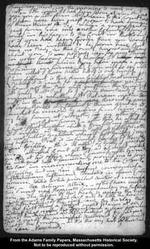
THURDSDAY [26 OCTOBER].
Went in the morning to wait on Mr. Prat. He inquired if I had been sworn at Worcester? No. Have you a Letter from Mr. Putnam to the Court? No. It would have been most proper to have done one of them things first. When a young Gentleman goes from me into another County, I always write in his favour to the Court in that County, or if you had been sworn, there, you would have been intitled to be sworn here. But now, no Body in this County knows any Thing about you. So no Body can say any Thing in your favour, but by hearsay. I [illegible] believe you have made a proper Proficiency in science, and that you will do very well from what I have heard, but that is only hearsay. [How different is this from Gridleys Treatment? Besides it is weak, for [illegible] neither the Court nor the Bar will question the Veracity of Mr. Gridly and Mr. Prat, so that the only Uncertainty that can remain is whether Mr. Putnam was in Earnest, in the [illegible] Account he gave of my Morals and Studies to them Gentleman, which cannot be removed by a Line from him, or by my being sworn at Worcester, or any other Way than by getting Mr. Putnam sworn.] After this, he asked me a few, short Questions about the Course of my studies which I answered, and then came off as full of Wrath as [I] was full of Gratitude when I left Gridley the morning before. Prat is infinitely harder of Access than Gridley. He is ill natured, and Gridley is good natured. -- Attended Court all Day, and at night waited on Otis at his office where I conversed with him and he, with great Ease and familiarity, promised me to join the Bar in recommending me to the Court. Mr. Gridley lent me Van Muydens Compendiosa Institutionum Justiniani Tractatio in usum Collegiorum. Editio tertia prioribus Auctior et emendation. Pax Artium Altrix. -- After I have mastered this, I must read Hoppius's Commentary on Justinian. The Design of this Book is [to] explain the technical Terms of the civil Law, and to settle the Divisions and Distributions of the civil Law. By the Way this is the first Thing a student ought to aim at, viz. distinct Ideas under the terms and a clear apprehension of the Divisions and Distributions of the science. This is one of the principal Excellences of Hawkins's Pleas of the Crown, and it is the very End of this Book of Van Muyden's.
Page 12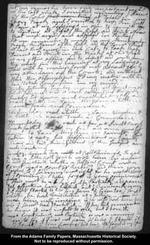
Let me remarke here one important neglect of the last Week. I omitted minuting the Names of the Cases that were tried at Trial in my Ivory Book, and I omitted to keep Pen, Ink and Paper at my Lodgings, in order to comitt to Writing, at Night, the Cases and Points of Law that were argued and adjudged in the Day.
Let me remember to mark in my Memorandum Book, the Names of the Cases, and the Terms and Points of Law that occur in each Case, to look these Terms and Points in the Books at Otis's, Prats or any other office, and to digest and write down the whole in the Evening at my Lodgings. This will be reaping some real Advantage, by my Attendance on the Courts, and, without this, the Observations that I may make will lie in total Confusion in my mind.
FRIDAY, SATURDAY, SUNDAY, MONDAY [27-30 OCTOBER].
All Spent in absolute Idleness, or what is worse, gallanting the Girls.
TUESDAY [31 OCTOBER].
Set down, and recollected my self, and read a little in Van Muyden, a little in naval Trade and Commerce.
WEDNESDAY [1 NOVEMBER].
Read a little in Van Muyden, and a little in naval Trade and Commerce.
THURDSDAY [2 NOVEMBER].
Rode as far as Smelt Brook. Breakfasted, made my fire and am now set down to Van Muyden in Earnest. His latin is easy, his definitions are pretty clear, and his Divisions of the subject, are judicious.
SUNDAY [5? NOVEMBER].
Drank Tea with at Coll. Quincy's. He read to me a Letter Coll. Gouch wrote him in answer to his Questions, whether a justices Court was a Court of Record? and then concluded, "So that Sammy was right, for he was all along of that Opinion. I have forgot what your Opinion was?" [This must be a Lye, or else Partiality and parental affection have blotted out the Remembrance that I first started to his son Sam and him too, the Doubt whether he had Jurisdiction as a justice -- and made him really imagine, what he wished had been true viz. that Samll. had started it. If he did remember he knew it was insult to me. But I bore it. Was forgetfulness, was Partiality, or was a cunning Design to try if I was not vain of being the Starter of the Doubt, the true Cause of his saying, He forgot what my Opinion was.]
Page 13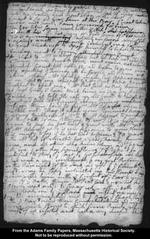
Sam has the utmost Reason to be grateful to Mr. Pratt. He will have an opportunity 100 times better than Mr. Prat had of rising [illegible] into the Practice and Reputation of the Law. I want to see and hear Sam at the Bar. I want to know how he will succeed. I am concerned for him. The Govr. a likes Sam much better than Ned. [illegible] He has seen or heard some of Neds freaks. This is a [illegible] Partiality in favor of one Child and against another quite indecent in a father. Tis great Weakness to expose himself so before Strangers.
MONDAY [6? NOVEMBER].
Went to Town. attended upon Court. Went to Mr. Gridleys office, but he had not returned to Town from Brookline. Went again. Not returned. Attended Court till after 12 and began to grow uneasy expecting that Quincy would be sworn and I have no Patron, when Mr. Gridly made his Appearance, and on sight of me, whispered to Mr. Prat, Dana, Kent, Thatcher &c. about me. Mr. Prat said no Body knew me. Yes, says Gridley, I have tried him, he is a very sensible Fellow. -- At last He rose up and bowed to his right Hand and said "Mr. Quincy," when Quincy [illegible] rose up, then bowed to me, "Mr. Adams," when I walked out. "May it please your Honours, I have 2 young Gentlemen Mr. Q. and Mr. Adams to present for the Oath of an Attorney. Of Mr. Q. it is sufficient for me to say he has lived 3 Years with Mr. Prat. Of Mr. Adams, as he is unknown to your Honours, It is necessary to say that he has lived between 2 and 3 Years with Mr. Putnam of Worcester, has a good Character from him, and all others who know him, and that he was with me the other day several Hours, and I take it he is qualified to study the Law by his scholarship and that he has made a very considerable, a very great Proficiency in the Principles of the Law, and therefore that the Clients Interest may be safely intrusted in his Hands. I therefore recommend him with the Consent of the Bar to your Honors for the Oath." Then Mr. Prat said 2 or 3 Words and the Clerk was ordered to swear us. After the Oath Mr. Gridley took me by the Hand, and wished me much joy and recommended me to the Bar. I shook Hands with the Bar, and received their Congratulations, and invited them over to Stones to drink some Punch. Where the most of us resorted, and had a very chearful [Chat?].
Page 14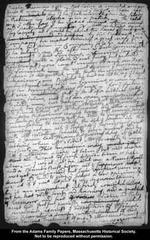
TUESDAY. DECEMBER 3 OR 4 [i.e. 5?].
Bob Paine is conceited and pretends to more Knowledge and Genius than he has. I have heard him [illegible] say that he took more Pleasure in solving a Problem in Algebra than in a frolick. He told me the other day, that he was as curious after a minute and particular Knowledge of Mathematicks and Phylosophy, as I could be about the Laws of Antiquity. [illegible] By his Boldness in Company, he makes himself a great many Enemies. His Aim in Company is to be admired, not to be beloved. He asked me what Duch Commentator I meant? I said Vinnius. -- Vinnius, says he, [illegible] (with a flash of real Envy, but pretended Contempt,) you cant understand one Page of Vinnius. -- He must know that human Nature is disgusted with such incomplaisant Behaviour. Besides he has no Right to say that I dont understand every Word in Vinnius, or even in [illegible] for he knows nothing of me. For the future let me [illegible] act the Part of a critical spy upon him, not that of an open unsuspicious friend. -- Last Superiour Court at Worcester he dined in Company with Mr. Gridly, Mr. Trowbridge, and several others, at Mr. Putnams, and altho a modest attentive Behaviour would have best become him in such a Company, yet he tried to ingross the whole Conversation to himself. He did the same, in the Evening, when all the judges of the Superiour Court with Mr. Winthrop, Sewall, &c. were present, and he did the same last Thanksgiving day, at Coll. Quincies, when Mr. Wibirt, Mr. Cranch &c. were present. This Impudence may [illegible] sett the Million a Gape at him but will make all Persons of Sense despize him, or hate him.
That evening at Putnams, he called me, a Numbskull and a Blunder Buss before all the Superiour Judges. I was not present indeed, but such expressions were indecent and tended to give the judges a low Opinion of me, as if I was despized by my Acquaintance. He is an impudent, illbred, conceited fellow. Yet he has Witt, sense, and Learning, and a great deal of Humour, and has of Virtues Virtue and Piety except his fretful, peevish, complaining Childish Complaints against the Disposition of Things. This Character is drawn with Resentment of his ungenerous Treatment of me, and Allowances must therefore be made, but these are unexaggerated facts.
Page 15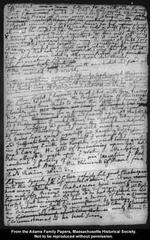
Lambert [illegible] setts up for a Witt and a Humourist. He [illegible] is like a little nurley ill natured Horse that [illegible] kicks at every Horse of his own size, [illegible] but lears and shears off from every one that is larger. [illegible] I should mind what I say before him for he [illegible] [is] always watching for wry Words to make into a droll story to laugh at. He laughs at John Thayer, for saying, "Lambert, I am sorry [I] am your good Friend I am sorry. This will cost you between 2 and 3 hundred Pounds." And it was a silly, [impertinent?], ignorant Speech. He laughs at Field for being nettled at his laughter. Field complained that he laughed at him. Lambert said, I will laugh when I please. If you carry me to the Rat hole I will laugh all the Way, and after I get there. -- Such fellows are hated by all mankind, yet they [illegible] rise and make a figure, and People dred them. [illegible]
Altho men of [illegible] bitter witt, are hated and feared, yet they are respected, by the World.
Quire, was there ever a Witt, who had much Humanity and Compassion, much Tenderness of Nature? Mr. Congreve was tender, extreamly tender of giving offence to any man. Dr. Arbuthnot was as great a Wit and Humourist, yet he was tender, and prudent. Mr. Cranch has Witt, and is tender and [gentle?].
The other Night I happened to be at the Drs., with Ben. Veasey. He began to prate upon the Presumption of Philosophers in erecting Iron Rods to draw the Lightning from the Clouds. [illegible] His Brains were in a ferment with strong Liquor and he [illegible] railed, and foamed against those Points and the Presumption that erected them, in Language taken partly from Scripture and partly from the drunken Disputes of Tavern Philosophy, in as wild mad a manner as King Lear raves, against his Daughters Disobedience and Ingratitude, and against the meaness of the Storm in joining with his Daughter against him in Shakespears Lear. He talked of presuming upon God as Peter attempted to walk upon the Water, attempting to controul the Artilry of Heaven, an Execution that Mortal man cant Stay -- the Elements of Heaven, fire, Heat, Rain, Wind, &c.
Let me search for the Clue, which Led great Shakespeare into the Labyrinth of mental Nature! Let me examine how men think. Shakespeare had never seen in real Life Persons under the Influence of all those Scenes of Pleasure and distress, which he has described in his Works, but he imagined how a Person of such a Character would behave in such Circumstances, by analogy from the Behaviour of others that were most like that Character in [illegible] nearly similar Circumstances, which he had seen.
Page 16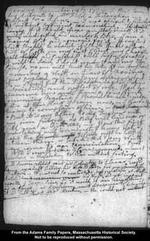
MONDAY. DECEMBER 18TH. 1758
I this Evening delivered to Mr. Field, a Declaration in Trespass for a Rescue. I was obliged to finish it, without sufficient examination. [illegible] If it should escape an Abatement, it is quite indigested, and unclerklike. I am ashamed of it, and concerned for it. If my first Writt should be abated, if I should throw a large Bill of Costs on my first Client, my Character will suffer and Business will suffer greatly. It will be said, I dont understand my Business. No one will trust his Interest in my hands. I never Saw a Writt, on that Law of the Province. I was perplexed, and am very anxious about it. Now I feel the Dissadvantages of Putnams Insociability, and neglect of me. Had he given me now and then a few Hints concerning Practice, I should be able to judge better at this Hour than I can now. I have Reason to complain of him. [illegible] But, it is my Destiny to dig Treasures with my own fingers. No Body will lend me or sell me a Pick axe. How this first Undertaking will terminate, I know not. I hope the Dispute will be settled between them, or submitted, and so my Writt never come to an Examination. But if it should I must take the Consequences. I must assume a Resolution, to bear without freting.
Heard Parson Wibirt exert his Casuistry to J. Spear. Warned him against selling his [drowned?] Sheep for merchantable Mutton. It was not so nutritive nor palatable as Mutton butchered [illegible] and dressed, and therefore, was not worth the same Price, and it would be an Imposition and a Cheat that his Conscience must disapprove to describe it and sell it as good Mutton. He could not without [sentence unfinished.]
Page 17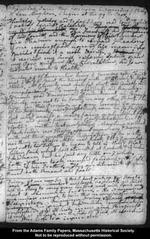
WEDNESDAY [20 DECEMBER].
I am this forenoon, resuming the Study of Van Muyden. I begin at the 99th Page.
THURDSDAY [21 DECEMBER].
Yesterday and to day I have read loud, Tullius 4. Orations against Cataline. [illegible] The Sweetness and Grandeur of his sounds, and the Harmony of his Numbers give Pleasure enough to reward the Reading if one understood none of his meaning. Besides I find it, a noble Exercise. [illegible] It exercises my Lungs, raises my Spirits, opens my Porrs, quickens the Circulations, and so contributes much to Health.
TUESDAY, 26 OF DECEMBER.
Being the Evening after Christmas, the Dr. and I spent the Evening with Mr. Cleverly and Major Miller. Mr. Cleverly was chearful, alert, sociable and complaisant. So much good sense, and knowledge, so much good Humour and Contentment, and so much Poverty, are not to be found, in any other House I believe in this Province. I am amazed that a man of his Inginuity, and sprightliness, can be so shiftless. But what avails a noisy fame, a plentiful fortune, and great figure and Consideration in the World? Neither Prat nor Gridley, Mayhew nor Eliot, Stockbridge nor Hersey appear more easy and happy with all their wealth and Reputation, than he with neither. Major Miller was sedate, but the Conversation was not to his Taste. He began to tell what this and that fellow said, what Coll. Oliver did at Dorchester and what he did at Deadham, but he said very little on the whole. Both of them took unused freedoms with Coll. Quincy and his Brother . They are determined to esteem them both Knaves and fools.
FRIDAY [29 DECEMBER].
Let me see, if Bob [Paine] dont pick up this Story to laugh at. Lambert will laugh no doubt, and will tell the story to every man he sees, and will squib me about it, whenever he sees me. He is impudent and unfair enough, to turn this on every Occasion to my Disadvantage. Impudence, Drollery,Villany, [illegible] in Lambert, Indiscretion, Inconsideration, Irresolution, and ill Luck in me, and Stinginess as well as ill Luck on the Side of Field, all unnite in this Case to injure me.
Page 18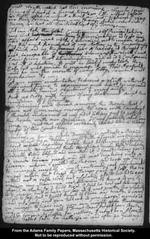
Fields Wrath waxed hot this morning. When he found himself defeated a second time. He wished the affair in Hell, called Lambert a Devil and said, "That's always the Way in this Town, when any strange Devil comes into Town, he has all the Priviledges of the Town."
Let me Note the fatal Consequences of Precipitation. My first [illegible] Determination, what to do in this affair was right. I determined not to meddle. But By the cruel Reproaches of my Mother, by the Importunity of Field, and by the fear of having it thought I was incapable of [illegible] drawing the Writt, I was seduced from that determination, and what is the Consequence? The Writt is defective. It will be said, I undertook the Case but was unable to manage it. This Nonsuit will be in the mouth of every Body. Lambert will proclaim it.
Let me never undertake to draw a Writt, without sufficient Time to examine, and digest in my mind all the Doubts, Queries, Objections that may arise. -- But no Body will know of any Abatement except this omission of the County.
An opinion will spread among the People, that I have not Cunning enough to cope with Lambert. I should endeavour at my first setting out to possess the People with an Opinion of my subtilty and Cunning. But this affair certainly looks like a strong Proof of the Contrary.
SATURDAY [30 DECEMBER].
How a whole Family is put into a Broil sometimes by a Trifle.
My P. and
M. disagreed in Opinion about boarding Judah, that Difference occasioned passionate Expressions, those Expressions made Dolly and Judah snivell,
Peter observed and mentioned it, I faulted him for it, which made him mad and all was breaking into a flame, when I quitted the Room, and took up Tully to compose myself. My P. continued cool and pleasant a good while, but had his Temper roused at last,
tho he uttered not a rash Word, but resolutely asserted his Right to govern. My Mamma was determined to know what my P. charged a Week for the Girls Board. P. said he had not determined what to charge but would have her say what it was worth. She absolutely refused to say. But "I will know if I live and breath. I can read yet. Why dont you tell me, what you charge? You do it on purpose to
teaze me. You are mighty arch this morning. I wont have all the Towns Poor brought here, stark naked, for me to clothe for nothing. I wont be a slave to other folks folk for nothing."-- And after the 2 Girls cryed.
Page 19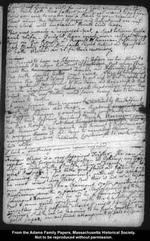
-- "I must not speak a Word
[to] your Girls, Wenches, Drabbs. I'le kick both their fathers, presently.
[You] want to put your Girls over me, to make me a slave to your Wenches." Thus when the Passions of Anger and Resentment are roused one Word will inflame them into Rage.
This was properly a conjugal Spat. A Spat between Husband and Wife. I might have made more critical observations on the Course and Progress of human Passions if I had steadily observed the faces, Eyes, Actions and Expressions of both Husband and Wife this morning.
[illegible] M. seems to have no Scheme and Design in her Mind to persuade P. to resign his Trust of Selectman. But when she feels the [illegible] Trouble and Difculties that attend it she fretts, squibs, scolds, rages, raves.
None of her Speeches seem the Effect of any Design to get rid of the Trouble, but only natural Expressions of the Pain and Uneasiness, which that Trouble occasions. Cool Reasoning upon the Point with my Father, would soon bring her to his mind or him to hers.
Let me from this remark distinctly the Different Effects of Reason and Rage. Reason, [illegible] Design, Scheme, governs pretty constantly in Puts [Putnams] House, but, Passion, Accident, Freak, Humour, govern in this House. Put knows what he wants, and knows the Proper means to procure [illegible] it, and how to employ them. He employs, Reason, Ridicule, Contempt, to work upon his Wife.
I feel a fluttering concern upon my mind.
Andrew Oliver is a very sagacious Trifler. He can decypher, with surprizing Penetration and Patience, any Thing wrote in signs, whether English, Latin, or French. But to what Purpose? Tis like great skill and Dexterity in Gaming, used only for Amuzement. With all his Expertness he never wins any Thing. But this is his Way to fame. One man would be a famous Orator, another a famous Physician, another a famous Phylosopher, or a 4th a famous Dancer, and he would be a famous Decypherer. But I am quite content with the 24 Letters without inventing all the possible Marks that might signify the same Things. Ned [Quincy] is learning to be such another Nugator Sagax, an artificial arrangement of Dots and Squares.
Page 20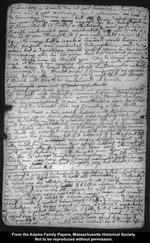
WEDNESDAY [JANUARY 1759].
Drank Tea at Coll. Quincies. Spent the Evening there, and the next morning. In the afternoon, rode out to German Town.
[Hannah] [Quincy] or O. Suppose you was in your Study, very busy engaged in the Investigation of some Point of Law, or Philosophy, and your Wife should interrupt you accidentally and break the Thread of your Thoughts, so that you never could recover it?
Ego. No man, but a crooked Richard, would blame his Wife, for such an accidental Interruption. And No Woman, but a Xantippe, would insist upon her Husbands Company, after he had given her his Reasons for desiring to be alone.
O. Should you like to spend your Evenings, at Home in reading and conversing with your Wife, rather than to spend them abroad in Taverns or with other Company?
Ego. Should prefer the Company of an agreable Wife, to any other Company for the most Part, not always. I should not like to be imprisoned at home.
How should you feel if your wife should
O. Suppose you had been abroad, and came home fatigued and perplexed, with Business, or came out of your Study, wearied and perplexed with Study, and your Wife should meet you with an unpleasant, or an inattentive face, how should you feel?
I would flee my Country, or she should.
O. How shall a Pair avoid falling into Passion or out of humour, upon some Occasions, and treating each other unkindly.
Ego. By resolving against it. Forbid angry words &c. [illegible] Every Person knows that all are liable to mistakes, and Errors, and if the Husband finds his Wife in one he should [illegible] reasonably and convince her of it, instead of being angry, and so on the Contrary. But if it happens, that both get out of humour and a dispute an angry dispute ensues, yet both will be sorry when their anger subsides, and mutually forgive and ask forgiveness, and love each other the better for it, for the future.
O. thinks more than most of her Sex. She is always thinking or Reading. She sitts and looks steadily, one way, very often, several minutes together in thought. [illegible] looks pert, sprightly, gay, but thinks and reads much less than O.
[illegible] expos'd himself to Ridicule, by affectation, by Pretensions to Strength of mind and Resolution, to depth and Penetration. Pretensions to Wisdom and Virtue,
superiour to all the World, will not be supported by Words only.
[illegible] If I tell a man I am wiser and better than he or any other man, he will either
despize, or hate, or pity me, or perhaps all 3. -- I have not conversed enough with the World, to behave rightly. I talk to Paine about Greek, that makes him laugh. I talk to Sam Quincy about Resolution, and being a great Man, and study and improving Time, which makes him laugh. I talk to Ned, about the Folly of affecting to be a Heretick, which makes him mad. I talk to H
annah and Easther about the folly of Love, about
despizing it, about being above it, pretend to be insensible of tender Passions,
Page 21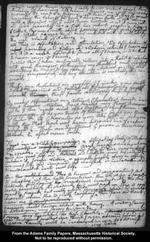
which makes them laugh. I talk to Mr. Wibirt about the Decline of Learning, tell him, I know no young fellow who promises to make a figure, cast Sneers on Dr. Marsh for not knowing the Value of old Greek and Roman Authors, ask "when will a Genius rise, that will shave his Beard, or let it grow rather and sink himself in a Cell, in order to make a figure." I talk to
Parson Smith about
despizing gay Dress, grand Buildings, great Estates, fame, &c. and being contented with what will satisfy the real Wants of Nature.
All This is Affectation and Ostentation. 'Tis Affectation of [illegible] Learning, and Virtue and Wisdom, which I have not, and it is a weak fondness to shew all that I have, and to be thot to have more than I have.
Besides this I have insensibly fallen into a Habit of affecting Wit and Humour, of Shrugging my Shoulders, and moving [and] distorting the Muscles of my face. My Motions are stiff and uneasy, ungraceful, and my attention is unsteady and irregular.
These are Reflections on myself that I make. They are faults, Defects, Fopperies and follies, and Disadvantages. Can I mend [illegible] these faults and supply these Defects?
O. makes Observations on Actions, Characters, Events, in Popes Homer, Milton, Popes Poems, any Plays, Romances &c. that she reads and asks Questions about them in Company. What do you think of Helen? What do you think of Hector &c. What Character do you like best? Did you wish the Plot had not been discovered in Venice preserved? These are Questions that prove a thinking Mind. E. asks none such.
Thus in a Wild Campaign, a dissipating Party of Pleasure, observations [illegible] and Improvement may be made. Some Foppery, and folly and Vice, may be discerned in ones self, and Motives, and Methods may be collected to subdue it. Some Virtue, or agreable Quality may be observed in ones self and improved and cherished, or in another and transplanted into ones self.
O. [illegible] Tho O. knows and can practice the Art of pleasing, yet she fails, sometimes. She lets us see a face of Ridicule, and Spying, sometimes, inadvertently, tho she looks familiarly, and pleasantly for the most part. She is apparently frank, but really reserved, seemingly pleased, and almost charmed, when she is really laughing with Contempt. Her face and Hart have no Correspondence.
Han nah checks Parson Wibirt with Irony. -- It was very sawcy to disturb you, very sawcy Im sure &c.
I am very thankful for these Checks.
[illegible] Good Treatment makes me think I am admired, beloved, and
[my] own Vanity will be indulged in me. So I dismiss my Gard
Page 22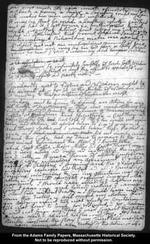
and grow weak, silly, vain, conceited, ostentatious. But a Check, a frown, a sneer, a Sarcasm rouses my Spirits, makes me more careful and considerate. It may in short be made a Question, whether good Treatment or bad is the best for me, i.e. wether Smiles, kind Words, respectful Actions, dont betray me into Weaknesses and Littlenesses, that frowns, Satirical Speeches and contemptuous
Behaviour, make me avoid.
Mr. Wibirt has not an unsuspicious openness of face. [illegible] You may see in his face, a silly Pain when he hears the Girls, a whispering, and snickering.
[illegible] Is Mrs. Palmer so infinitely sensible of such soft, tender scenes and actions, or, does she affect to appear so? Or is it partly affected and partly real?
Popularity, next to Virtue and Wisdom, ought to be aimed at. For it is the Dictate of Wisdom, and is necessary to the practice of Virtue in most.
Yesterday, went down to defend an Action for an old Horse
vs. Samll. Spear. This was undertaking the relief of distressed Poverty, the
Defence of Innocence and justice,
vs. Oppression, and Injustice.
Capt. Thayer and Major Crosby too had told the Plaintiff that he could not maintain his Action, and advised him to drop it or agree it. And Thayer spoke out, "I would have these Parties agree." I
[illegible] did not clearly understand the Case, had no Time to prepare to fix in my mind beforehand the Steps that I should take. And
Capt. Hollis, Major Miller, and
Captn. Thayer, were all 3 very active, and busy and in. terested themselves in the suit. It was a scene of absolute Confusion. Major Crosby persuading an Agreement, the Parties raging and scolding, I arguing and the 3
Voluntiers proposing each one his Project. And all the Spectators smiling, whispering &c. My Attention was dissipated. I committed oversights, omissions, inexpert Management. I should have adhered to the Relation my Client gave me, and believed nothing that came from the other side, without Proof. I should have insisted upon the Entry, and opposed any Motion for an Adjournment till next Week or Continuance till next Hour, to send for Witnesses. For Madam Q. could not swear any Thing, that can support this Action. Should have offered to admit all she could say. If I had strictly pursued the story, that my Client told me, I should have demanded an Entry of the Action, or else
Page 23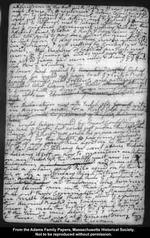
a Dismission of the Defendant with Costs. It was equally idle and tame to continue the Action, to send for a Witness, and to submit it to referees. For the Witness if sent for could not support the Action, and to submit the original Debt to Referees, was to submit nothing. For by the original Agreement, nothing was due. Agreement was to take the Horse and keep him, and if he lived till April, to pay 2 dollars for him, but if he died before, to pay nothing. Now he actually died in February, and therefore nothing by Contract was to be paid. The Keeping of so old an Horse was more than the service he could do, was worth. The Hay he eat would have hired more riding and drawing than that Horse did
thro that Winter.
If Spear had applied to [illegible] such as know, he would not have brot that Writ. But Deputy Sheriffs, petit justices, and pettifogging Meddlers, like Faxon, Niles, Hollis, attempt to draw Writts, and draw them wrong oftener than they do right. [illegible]
The Declaration was an
[Indebitatus ] [Assumpsit] [illegible] with an Account annexed, for a Horse, sold and delivered.
[illegible] He could have proved, by Spears Confession, that he had the Horse, but could not prove the Sale
or Delivery of the Horse, nor could he prove any Price agreed on by the Parties. Far from producing Proof of any express Price agreed on by the Parties at the sale and Delivery, he cant prove the Sale and delivery itself. Now to maintain an Action on an Indeb. Ass. the Plaintiff must aver in his Declaration,
[illegible] and prove at the Trial, a certain, express Price, agreed on by the Parties, or else a customary Price. Tis true there is this Exception to the general Rule, that Merchants
[illegible] and Tradesmen, who keep running Accounts open with their Customers, and deal out their Commodities and Manufactures in small Parcells, shall be allowed to produce their Account Books in Evidence, and if they will swear that they made the Entries of the several Articles
att the times they were delivered, and that they charged the Price for them, that was at that time customary, they shall be allowed to recover.
Page 24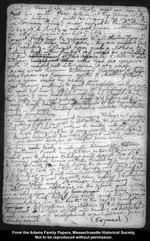
But is this Case like that. Will Mr. Spear swear that he entered this Article at the time of the Sale and delivery, and will he swear that he charged the customary Price? Pray what is the Customary Price of a Horse. Are not some customarily bot for 100 and some for less than 100.
I must study how to manage Eb. and Atherton Thayer and Hollis, and Eb. Miller and Faxon. They are meddlers, hinters, and Projectors. I should have made a Motion to the Justice, that either the Defendant or I might be consulted in the settlement of this Affair, and that Miller, Hollis and Thayer [illegible] who had no concern with it, might not determine it, as they please. -- I pray your Honour to silence the Clamour of those who have no Concern with the Matter, that those who have may be heard.
Capt. Thayer pretends to great Knowledge in the Law. He could not bear to lose the Honor of knowing and telling Mr. Spear, that an Indeb. Ass. could not lie, but that Quantum Meruit could [in] this Case. He was proud, bragged of it before all the Company, bragged, boasted, was ostentatious of his Knowledge in Law. So many hinting advice, making Proposals, &c., make Confusion.
O. Pain [illegible] aims at so many Things, but especially at getting Cash, that he will be distracted. He pursues Cash with all his Hart and soul. He writes well and tells a very droll story, but he is very peevish, fretful, odd tempered. He thinks himself in high favour with the Ladies, but he little thinks how he is blasted sometimes.
TUESDAY JANUARY 1759
[illegible] Took a ride after Dinner [illegible] to Gullivers Brook in Milton, returned home. Went over to Deacon Belchers and drank Tea, and in the Evening walked home with O. Strolled by the House down to Mr. Borlands, then back down the farm Lane as far as the Gate, then back, up the Hill, and home. Met Mr. Wibirt at the Coll's door, went with him to his Lodgings, slept with him and spent all the next day with him, reading the Reflections on Courtship and Marriage, and afternoon the 4 Satires of John Oldham on the Jesuits, and his Satyr on a Woman who by [illegible] breaking her Engagement had killed his friend, and his Bion, or Lamentation on the Death of the Earl of Rochester, [illegible] a Pastoral in Imitation of the Greek of Moschus, a Piece as soft, and tender, as his Satyrs are nervous and malignant, or perhaps more properly indignant.Copied. ["Copied. " added by Charles Francis Adams] [This notation was added to the original manuscript diary by Charles Francis Adams who copied many of John Adams's diary entries into other manuscript volumes. ]
Page 25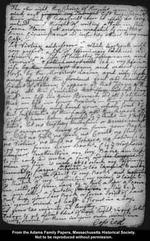
The other night, the Choice of Hercules came into my mind, and engaged my thoughts left Impressions there which I hope will never be effaced nor long unheeded. I thought of writing a Fable, on the same Plan, but accommodated, by omitting some Circumstances and inserting others, to my own Case.
Let Virtue address me -- "Which, dear Youth, will you prefer? a Life of Effeminacy, Indolence and obscurity, or a Life of Industry, Temperance, and Honour? Follow me, I will Take my Advice, rise by the morning dawn and mount your Horse, by the Mornings dawn, and shake away amidst the great and beautiful scenes of Nature, that appear at that Time of the day, all the Crudities [illegible] that are left in your stomach, and all the obstructions that are left in your Brains. Then return to your Study, and bend your whole soul to the Institutes of the Law, and the Reports of Cases, that have been adjudged by the Rules, in the Institutes. Let no trifling Diversion or amuzement or Company decoy you from your Books, i.e. let no Girl, no Gun, no Cards, no flutes, no Violins, no Dress, no Tobacco, no Laziness, decoy you from your Books. (By the Way, Laziness, Languor, Inattention, are my Bane, am too lazy to rise early and make a fire, and [illegible] when my fire is made, at 10 o'clock my Passion for knowledge, fame, fortune or any good, is too languid, to make me apply with Spirit to my Books. And [illegible] by Reason of my Inattention my mind is liable to be called off from Law, by a Girl, a Pipe, a Poem, a Love Letter, a Spectator,&c. &c. &c. a Play, &c.) But, keep your Law Book or some Point of Law in your mind at least 6 Hours in a day. (I grow too minute and lengthy.)
Labour to get distinct Ideas of Law, Right, Wrong, Justice, Equity. Search for them in your own mind, in
Copied. ["Copied." added by Charles Francis Adams] [This notation was added to the original manuscript diary by Charles Francis Adams who copied many of John Adams's diary entries into other manuscript volumes. ]
Page 26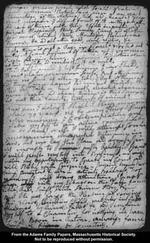
Roman, grecian, french, English Treatises of natural, civil, common, Statute Law. Aim at an exact Knowledge of the Nature, End, and Means of Government. Compare the different forms of it with each other and each of them with their Effects on public and private Happiness. Study Seneca, Cicero, and all other good moral Writers. Study Montesque, Bolinbroke,
[Vinnius?], &c. and all other good, civil Writers, &c."
Prat. There is not a Page in Flavels Works without several sentences of Latin. Yet the common People admire him. They admire his Latin as much as his English, and understand it as well. [illegible] preached the best sermon that ever I heard. It was plain common sense. But other sermons have no sense at all. They take the Parts of them out of their Concordances and connect them together Hed and Tail.
How greatly elevated, above common People, and above Divines is this Lawyer. Is not this Vanity, littleness of mind?
What am I doing? Shall I sleep away my whole 70 Years. No by every Thing I swear I will renounce the Contemplative, and betake myself to an active roving Life by Sea or Land, or else I will attempt some uncommon unexpected Enterprize in Law. Let me lay the Plan and arouse Spirit enough to [illegible] push boldly. I swear I will push myself into Business. I will watch my Opportunity, to speak in Court, and will strike with surprize -- surprize Bench, Bar, Jury, Auditors and all. Activity, Boldness, Forwardness, will draw attention. Ile not lean, [illegible] with my Elbows on the Table, forever like Read, Swift, Fitch , Skinner, Story, &c. But I'le not forego the Pleasure of ranging the Woods, Climbing Cliffs, walking in fields, Meadows, by Rivers, Lakes, &c., and confine my self to a Chamber for nothing. Ile have some Boon, in Return, Exchange, fame, fortune, [illegible] or something.
Page 27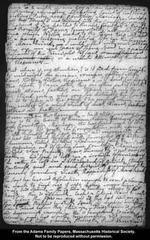
Here are 2 nights, and one day and an half, spent in a softening, enervating, dissipating, series of hustling, pratling, Poetry, Love, Courtship, Marriage. During all this Time, I was seduced into the Course of unmanly Pleasures, that Vice describes to Hercules, forgetful of the glorious Promises of Fame, Immortality, and a good Conscience, which Virtue, makes to the same Hero, as Rewards of a hardy, toilsome, watchful Life, in the service of Man kind. I could reflect with more satisfaction on an equal space of Time spent in a painful Research of the Principles of Law, [illegible] or a resolute attempt of the Powers of Eloquence.
But where is my Attention? Is it fixed from sunrise to midnight, on grecian, roman, gallic, british Law, History, Virtue, Eloquence? I dont see clearly The objects, that I am after. They are often out of Sight. Moats, Attoms, feathers, are blown into my Eyes, and blind me. Who can see distinctly the Course he is to take, and the objects that he pursues, when in the midst of a whirl Wind of dust, straws, feathers attoms and feathers.
Let me make this Remark. In [Parson ] [Wibirds] Company, Something is to be learned, of human Nature, human Life, Love, Court Ship, Marriage. He has spent much of his Life, from his Youth, in Conversation with young and old Persons of both sexes, maried and unmaried, and therefore has his Mind stuffed with Remarks and stories of human Virtues, and Vices, Wisdom and folly, &c. But his Opinion, out of Poetry, Love, Court ship, Mariage, Politicks, War, Beauty, Grace, Decency &c. is not very valuable. His Soul is lost, in a dronish effeminacy. Ide rather be lost in a Whirlwind of Activity, Study, Business, great and good Designs of promoting the Honour, Grandeur, Wealth, Happiness of Mankind.
He says he has not Resolution enough to court a Woman. He wants to find one that will charm, conquer him and rouse his spirit. He is like a Turkey, retiring to Roost. She is difficult, looks at several Places, to roost on, before she fixes on any, and when she has fixed on one she
[illegible] stretches her Neck, squats, and changes her Posture several Times before she flies up. This Simile is pretty and humorous enough. He is benevolent, sociable, friendly, and has a pretty Imagination, Wit, some
Humour but little grandeur, Strength, Penetration of
[mind.]
Page 28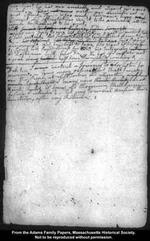
In short, he has an amiable and elegant, not a great mind. Paine has
[illegible] neither an amiable nor a great Mind. There is too much Malignance, Envy, Conceit and ostentation, in it, to be amiable, and too much Unsteadiness to be great.
Wibirt [illegible] exposes very freely to me his Disposition, the past and present state of his mind, his susceptibility of Impressions from Beauty &c., [illegible] his Being amourous, and inclined to love, his Want of Resolution to Court, his Regard, fondness, for O., his Intimacy [illegible] and dalliance with her &c. He has if I mistake not a good many [illegible] half born Thoughts, of courting O.
FEB. 1.
I intend a journey to Worcester to morrow. How many observations shall I make on the People at West Town, and Worcester, and how [illegible] many new Hints, rules Ideas, Hints, Rules of Law, and Eloquence, shall I acquire before I return? Let my journal answer this Question, after my Return.
Page 29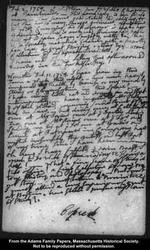
FEB. 2. 1759.
At Westtown, in Dr. Webbs Chamber at Hammonds. His landlady is an odd Woman. She seems good Natured, and obliging too, but she has so many shruggs, grimaces, affectations of Witt, Cunning, and Humour, as make her ridiculous. She is awkward, shamefaced, bashful, yet would fain seem sprightly, witty, &c. She is a Squaddy, masculine, Creature, with a swarthy pale face, a great staring, rolling Eye, a rare Collection of disagreable Qualities.
I have read several Letters, this afternoon and Evening, in the Turkish Spy.
WORCESTER FEB. 11. 1759.
I have been in this Town a Week this night. How much have I improved my Health by Exercise, or my mind by Study or Conversation, in this Space? I have exercised little, eat and drank and slept intemperately. Have inquired a little, of Mr. Putnam and of Abel Willard, concerning some Points of Practice in Law. But dining once at Coll. Chandlers, once at Mr. Pains, once at the Doctors, drinking Tea once at Mr. Paines, once at the Drs. and spending one Evening at the Drs., one at Gardiners and several at Putnams in Company has wasted insensibly the greatest and best Part of my time since I have been in Town. Oh how I have fulfilled the vain Boast I made to Dr. Webb, of reading 12 Hours a day! What a fine scene of study is this office! a fine Collection of Law, oratory, History, and Phylosophy. But I must not stay. I must return to Braintree. I must attend a long Superiour Court at Boston. How shall I pursue my Plan of Study?
Copied.
[The preceding text was added in the handwriting of Charles Francis Adams] [This notation was added to the original manuscript diary by Charles Francis Adams who copied many of John Adams's diary entries into other manuscript volumes. ]
Page 30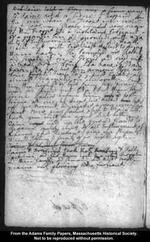
Bob Paine told a story and a scene very
Bob Paine acted a scene that happened on the [Common] when the Troops were reviewed by the Governor. People crouded very near to the Troops, till a highland serjeant of a gigantic size, and accoutred with a Variety of Instruments of Cruelty and Death, stalked out with his vast Halbert to drive them back. He brandished his Halbert and smote it on the Ground and cryed with a broad, Roaring Voice, Sta ban, i.e. Stand back. Sta ba. His size, armour, Phyz and Voice, frighted People so that they presd backwards and almost trampled on one another. But in the highest of his fury, he sprung onward, and shrieked out Sta, but then saw some Ladies before him, [illegible] which softened him. At once, he drops his Halbert, takes off his Bonnet, and makes a very complaisant Bow, pray Ladies, please to stand a little back, you will see a great deal better.
Pain [illegible] lifts up his Eyes and Hands to Heaven and cryes, of all Instruments of Defence, good Heavens, give me Beauty. It could soften the ferocity of your highland serjeant.
Paine, Dr. Wendel from Quincy
Paine and Dr. Wendel took Katy Quincy and Polly Jackson, and led them into a retired Room and there laughed, and screamed, and kissed and hussled. They came out glowing like furnaces.
Page 31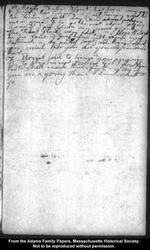
Mr. Marsh. Father Flynt has been very gay and sprightly, this sickness . Coll. Quincy was to see him, a fast day, and [illegible] was or appeared to be, as he was about taking leave of the old Gentleman, very much affected. The Tears flowed very fast. -- I hope Sir says he in a Voice of Grief, you will excuse my Passions. -- Ay, prithy, says the old Man,
I dont care much for you, nor your Passions neither.
F. Morris said to him, "you are going Sir to Abrahams Bosom, but I dont know but I shall reach there first." -- "Ay if you are a going there, I dont want to go."
Page 32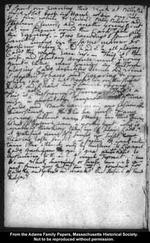
I spent one Evening this Week at Billy Belchers. I sat, book in Hand, on one side of the fire, while Dr. Wendell, Billy Belcher and Stephen Cleverly and another young Gentleman sat, in silence, round the Card Table, all the Evening. Two Evenings I spent att Samll. Quincys, in the same manner, Dr. Gardiner, Henry Q., Ned Q., and S.Q. all playing Cards the whole Evening. This is the wise and salutary amuzement, that young Gentlemen take every Evening in this Town, playing Cards, drinking Punch and Wine, Smoaking Tobacco, swearing &c. while 100 of the best Books lie on the shelves, Desks, and Chairs, in the same room. This is not Misspence of Time. This is a wise, a profitable, Improvement of Time. Cards, and Back Gammon, are fashionable Diversions. I'le be curst if any young fellow can study, in this town. What Pleasure can a young Gentleman, who is capable of thinking, take, in playing Cards? It gratifies none of the Senses, nor Sight, [illegible] Hearing, taste, smell, feeling. It can entertain the Mind only by hushng its Clamours. Cards, Back Gammon are the great antidotes to Reflection, to thinking, that cruel Tyrant within Us. What Learning, or Sense, are we to expect from young Gentlemen, in whom a fondness for Cards, &c. outgrows and choaks the Desire of Knowledge?
Page 33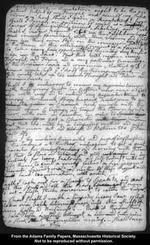
MARCH 14. 1759.
Reputation ought to be the perpetual subject of my Thoughts, and Aim of my Behaviour. How shall I gain a Reputation! How shall I Spread an Opinion of myself as a sensible Lawyer of distinguished Genius, Learning, and Virtue. Shall I make frequent Visits in the Neighbourhood and converse familiarly with Men, Women and Children in their own Style, on the common Tittletattle of the Town, and the ordinary Concerns of a family, and so take every fair opportunity of shewing my Knowledge in the Law? But this will require much Thought, and Time, and a very particular Knowledge of the Province Law, and common Matters, of which I know much less than I do of the Roman Law. This would take up too much Thought and Time and Province Law.
Shall I endeavour to renew my Acquaintance with those young Gentlemen in Boston who were at Colledge with me and to extend my Acquaintance among Merchants, Shop keepers, Tradesmen, &c. [illegible] and mingle with the Crowd upon Change, and trapes the Town house floor, with one and another, in order to [illegible] get a Character with them in Town. But this too will be a lingering method and will require more Art and Address, and Patience too than I am Master of.
Shall I, by making Remarks, and proposing Questions [to] the Lawyers att the Bar, endeavour to get a great Character for Understanding and Learning with them. But this is slow and tedious, and will not answer be ineffectual, for Envy, jealousy, and self Intrest, will not suffer them to give a young fellow a free generous Character, especially me. Neither of these Projects will [illegible] bear Examination, will avail.
Shall I look out for a Cause to Speak to, and exert all the Soul and all the Body [illegible] I own, to cut a flash, strike amazement, to catch the Vulgar? In short shall I walk a lingering, heavy Pace or shall I take one bold determined Leap into the Midst of some Cash and Business? That is the Question. A bold Push, a resolute attempt, a determined Enterprize, or a slow, silent, imperceptible creeping. Shall I creep or fly.
Page 34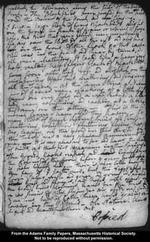
Walked, this afternoon, along the side of the [Bushy?] Pond. The Blackbirds were perched on the Trees round the Borders of the Pond, [illegible] and singing. I saw a large flock of Crow Blackbirds alight on the Ground, in search of Grain or Worms, I suppose. The Birds that were behind were perpetually flying over the Heads of all the rest, and alighting in the front of the flock, so that each Bird was in the front and Rear by turns, and all were chattering. It looked like a hovering, half walking, half flying flock of Blackbirds. Soon after, they rose, and alighted on the neighbouring Apple Trees, chattering, and singing all the Time. At the same time, a Number of Crows were croaking, at a little distance on one side, and a wood Pecker and a blue bird were whistling, and cackling, at a little Distance on the other. -- This is the first vernal scene I have observed this season. So many Birds of several different species, all singing, chattering, whistling, fluttering, flying, hopping, leaping, on the ground, in the Air, and on the Trees, was a very pleasant Amuzement to me. It is very pleasant to see and hear the flocks of Birds, at their first Appearance in the Spring. The Ground looks naked, [illegible] and lifeless yet. The Colour of the Ground, before the green [rises?] upp, is pale, lifeless, dead. There is very little beauty [in] the face of the Earth now, but the Vegetables will soon spring fresh and green, and young and sprightly [illegible] Grass, and flowers, and Roses, will appear on the Ground, buds, blossoms, leaves on the Trees, and 100 species of Birds, flying in Air, alighting on the Ground and on Trees, herds of Cattle, Sheep, horses, grazing and lowing in the Pastures. Oh Nature! how [ bright?] and beautiful thou art.
Copied.
[The preceding text was added in the handwriting of Charles Francis Adams] [This notation was added to the original manuscript diary by Charles Francis Adams who copied many of John Adams's diary entries into other manuscript volumes. ]
Page 35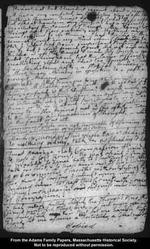
Means not but blunders round about a meaning.
M. has a very confused, blundering Way of asking Questions. She never knows distinctly what she is [after], but asks at Random, any Thing, and has a difficulty in recollecting the Names of Things. The Names of Things dont flow naturally into My Mind, when I have occasion to use them. I had the Idea of the General Court in my Mind when I said to Otis, the judges had [some?] important Business to do in &c., but the Words General Court did not arise with the Idea and therefore Otis thought I made [a] silly Speech. My Aunt Cunningham has the same difficulty, recollecting Words and Ideas too, especially, of Things that are sometime past. A slothful Memory, a slow, heavy Memory, in oposition to a quick prompt Memory.
[I?] read a letter from one in St.K. to one in P. concerning M. Chateleu going to this Coast. M. asks what is that. How confused is this Question? It wants much explanation and restriction, before an Answer can be given, for
[illegible] she asks who is that letter from or who to, or what Place from or to, or what about, and what Place was
Chateleu going to. She knows not what she asks. Tis [owing?] to the Hurry and Impatience of Thought -- which is the fault of us all.
Common People are not incapable of discerning the Motives and Springs of Words and Actions.
MARCH 18 [i.e. 19?]. MONDAY.
This whole Day is dedicated to walking, riding, talk, &c. No Reading to day.
Twas Avarice, not Compassion that induced [ . . . ] to pass the last Court. He was afraid that Pen would be provoked to appeal both to the Superior Court if he put both in suit, and so keep him out of his Money for 6 or 8 months. 6 months without Interest. Tis fear of loosing the Interest upon Interest that induces him to pass this Court. -- Oh Love of Money! -- oh, Avarice, disguised under the shew of Compassion!
I feel vexed, fretted, chafed, the Thought of no Business mortifies, stings me. I feel angry, vexed with my Uncle Field, [illegible] &c. But Let me banish these Fears. Let me assume a Fortitude, a Greatness of Mind.
Copied.
[The preceding text was added in the handwriting of Charles Francis Adams] [This notation was added to the original manuscript diary by Charles Francis Adams who copied many of John Adams's diary entries into other manuscript volumes. ]
Page 36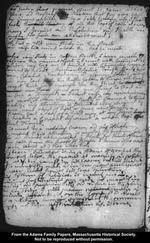
In such a gradual ascent to fame and fortune, and Business, the Pleasure that they give will be imperceptible, but by a bold, sudden rise, I shall feel [illegible] all the joys of each at once. Have I Genius and Resolution and Health enough for such an attchievement?
Oh but a Wit can study in the Streets and raise his mind above the Mob he meets.
Who can study in Boston Streets. I am unable to observe the various Objects, that I meet, with sufficient Precision. My Eyes are so diverted with Chimney Sweeps, Carriers of Wood, Merchants, Ladies, Priests, Carts, Horses, Oxen, Coaches, Market men and Women, Soldiers, Sailors, and my Ears with the Rattle Gabble of them all that I cant think long enough in the Street [illegible] upon any one Thing to start and pursue a Thought. I cant raise my mind above this mob Croud of Men, Women, Beasts and Carriages, to think steadily. My Attention is sollicited every moment by some new object of sight, or some new sound. A Coach, Cart, a Lady or a Priest, may at any Time, [illegible] by breaking a Couplet, disconcert a whole Page of excellent Thoughts.
What is meant by a nodding Beam, and pig of Leads He means that his Attention is necessary to preserve his Life and Limbs, as he walks the streets, for Sheets of Lead may fall from the Roofs of Houses. I know of no nodding Beam, except at the Hay Market.
Shybeares Dedication is in a strain of ironical, Humorous Satyr. He reasons as warmly and positively as if in earnest in his favour, but his Reasoning is so manifestly weak and in some places ambiguous that every Reader knows his true Intention. This System of Religion is indeed new. Religious Institutions are mere means of increasing and preserving Piety and Virtue in the World, and any Thing, that will produce national public and private advantages on the Happiness and Morals of a Nation, however repugnant to common sense, as Transubstantiation e.g. is true.
Page 37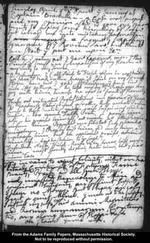
SUNDAY. APRIL 8TH. 1759.
Spent the Evening at Captain Bracketts. A Case was proposed and my Opinion asked, which gave me Opportunity to display some Knowledge of Law but betrayed me into mistaken Dogmatism. I am [illegible] frequently expose my Ignorance of the Province Law, but [things?] are started that put me upon Exn. [Examination].
Coll. Q. I value not the Governor's favours, more than this Pinch of Snuff, in Comparison of my Honour and my Duty to my Town.
B. Fessenden. The Coll. said to Field, when he was building his pen, "I had rather have it said on my Tomb Stone, here lies the good Mr. Quincy, than here lies the rich Mr. Apthorp." He told me that People were angry with him, because he was so fond of Honesty.
These reiterated Protestations in favour of Honesty, Goodness, Patriotism, or rather these verbal Pretensions to these Qualities raise Suspicions and Jealousies. Too much talk, Prate. Praise him self. He praises himself as much as other People censure him. Populus me sibilat sed plaudo meipsum. The People hiss him, and curse him, and reproach him, but he applauds, praises, admires himself. Does he believe what he says?
Fessenden, Nash, Field, Marsh, &c. &c. sneer, hiss, curse him. Most secretly despise, hate him, but they fear him too.
Tis in vain to expect felicity, without an habitual Contempt of Fortune, Fame, Beauty, Praise, and all such Things. and Unaffected Benevolence to Men and conscious Integrity are sufficient supports. I have no Money. But I have an easy Heart, a quiet Mind. [God] made us to be happy. I distress my self. This Animi Magnitudo and Rerum humanarum Contemptio, are alone secure of Happiness.
Oh Stoicks you are wise.
Page 38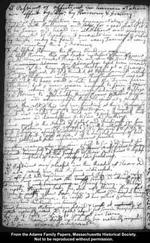
What Passions or affections in human Nature are affected by Satyr, by Humour, and Drollery?
There is some Affection in human Nature that is delighted with Humour and Satyr, for a good deal of it is to be seen and heard in all Nations, and among all Ranks of People. It prevails in every Country Parish, may be found in every Tavern, at every Town meeting thro the Province.
F. Oh blessed Storm. The Storm blowed me away. Oh blessed storm.
This was spoke in Person of one of the new Select Men, as Bracket, Thayer &c. and upon this secret Principle, that [illegible] an Advantage had been meanly taken of the thinness of the Meeting to get a Change of Town officers. So that it hinted at the meanness, and want of Influence in Town. Their Influence was not sufficient, to have carried a Vote, had the Town been together. But they were mean enough to seize that Opportunity when 3/4 of the Town were detained at Home by the storm, to assemble their Crew of Debtors and Labourers, and accomplish their Projects as they pleased. Thus, the Wit of this lay in hinting at their Meanness of Soul, and Insignificancy in the Town. It hinted that the Point was carried, not by Merit, nor by real Popularity, but by mean and clandestine Artifice, and Plotting.
How great is the Dread of Satyr and Ridicule in human Nature. Mrs. S. is afraid [Colonel] Q. and his [illegible] H. will laugh at her shape, dress, Behavior. Afraid of Laughter. I used to dread [James ] [Otis] and [Benjamin] [Kent] because I suspected they laughed at me. I used to dread [Putnam], because of his satirical and contemptuous smiles.
Another reason. We were pleased to see the old Gent diverting himself and laughing [illegible] at the success of their Artifices to depose him, instead of being angry and scolding.
What Passions are pleased in the Reader or Hearer, and what are vexed in the Person ridiculed.
Dr. S. after L.R. had turned him off, went into Church one day, and into the same Pew where L. was. She smiled, and almost giggled at him. That [illegible] stung him. He cryed a nasty, stinking jade, he did not think she was such a nasty yellow jade, before. Thus the Dr. diverted him self with her Colour. He laughed at her yellow Colour, in Revenge of her Ridicule on him.
Thus human Nature, when despized and laughed at,naturally is vexed, naturally vexed, and looks about for some Imperfection, Deformity, folly or Vice to laugh at in turn. And when a Man is deposed in [Town] meeting, he naturally imputes it to some mean Contrivance &c.
Page 39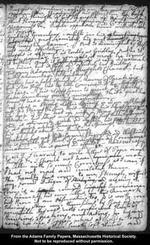
Ruggles's Grandeur consists in the quickness of his apprehension, Steadiness of his attention, the boldness and Strength of his Thoughts and Expressions, his strict Honour, conscious Superiority, Contempt of Meanness &c. People approach him with Dread and Terror.
Gridleys Grandeur consists in his [illegible] great Learning, his great [illegible] Parts and his majestic Manner. But is diminished by stiffness and affectation.
Ruggles is as proud, as lordly as Gridley. But he is more popular. He conceals it more. He times it better. And it [illegible] is easy and natural in him, but is stiff and affected in Gridley.
Tis an Advantage to Ruggles's Character, but a Disadvantage to Gridley's.
Gridley has a bold, spirited Manner of Speaking, but is too stiff, has too little Command of the Muscles of his face. His Words seem to pierce and search, have something quick and animating. He is a great Reasoner, and has a very vivid Imagination.
Prat has a strong, elastic Spring, or what we call Smartness, and Strength in his Mind. His Ideas seem to lie deep and to be brot up with a strong Effort of the Mind. His Ideas are vivid, and he sees their Differences. Otis is extreamly quick and elastic. His Apprehension is as quick as his Temper. He springs, and twitches his Muscles about in thinking.
Thatcher has not this same Strength and Elasticity. He is sensible, but slow of Conception and Communication. He is queer, and affected. He is not easy.
Coll. Q. I learn'd to write Letters of Pope and Swift &c. I should not have been able wrote a Letter with so much Correctness as I can, if I had not read and imitated them. The Faculty has come to me, strangely, without any formed Design of studying and acquiring it.
There is a
[illegible] concealed
[illegible] Encomium on himself, his own Letters, in this Remark, but there is an Observation too, which is worth considering. Men
[wear?] themselves, by slow and imperceptible Degrees, into confirmed Habits of thinking, Speaking, and Acting. He began early in Life, I suppose perhaps at
Colledge, to read these smooth, soft, Writers, and
Page 40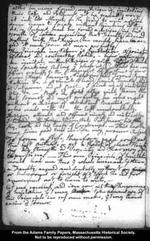
altho he never formed any Design of imitating their Ease and Politeness, yet he gradually wore it into his Mind. He learned to write as Children learn to Speak, without thinking what they do. Perhaps had he formed a Design in his Youth of acquiring that Faculty and read Authors with that Design, he would have acquired it much sooner and more perfectly.
The Principle in Nature is Imitation, Association of Ideas, and contrasting Habits. How naturally we imitate, without Design or with, ways Modes of thinking, Speaking, Acting, that please us! Thus we conform gradually to the Manners and Customs of our own family, Neighbourhood, Town, Province, Nation &c. At Worcester, I learned several Turns of Mind of Putnam, and at Boston I find my self imitating Otis, &c. -- But Query, Who will learn the Art soonest, and most perfectly, he who reads without a Design of extracting Beauties or he who reads with? The last undoubtedly. Design attends, and observes nicely, and critically. I learned with Design to imitate Put's Sneer, his sly look, and his look of Contempt. This look may serve good Ends in Life, may procure Respect.
To form a style, therefore, read constantly the best Authors. Get a Habit of clear Thinking and strength and Propriety and Harmony of Expression. This one Principle of Imitation would lead me thro the whole human System. A Faculty acquired accidentally, without any [illegible] Endeavours or forsight of the Effect. He read for Amuzement, not to learn to write.
Let me recollect, and con over, all the Phenomena of Imitation that I may [illegible] take advantage of this Principle in my own make, that I may learn easier and sooner.
Page 41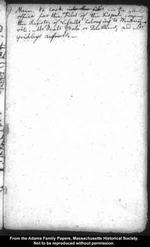
Mem. To look into the files in the Clerk's office, for the Files of the Dispute concerning the Registry of Vessells belonging to Newbury, viz. Mr. Prats state or Questions, and Mr. Gridleys Answers.
Page 42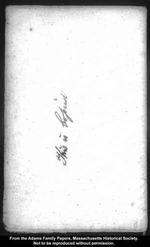
This is copied Copied. ["Copied. " added by Charles Francis Adams] [This notation was added to the original manuscript diary by Charles Francis Adams who copied many of John Adams's diary entries into other manuscript volumes. ]
Inside Back Cover
[Blank page -- no image available]
Back Cover
[Blank page -- no image available]











































